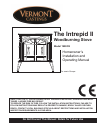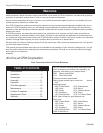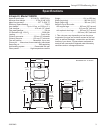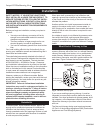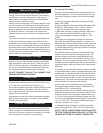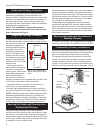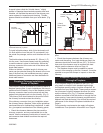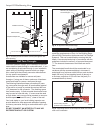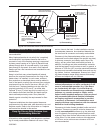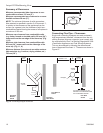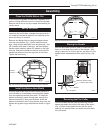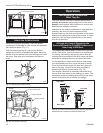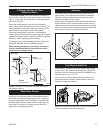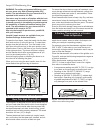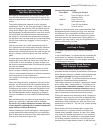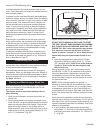
3
Intrepid II Woodburning Stove
30003840
Specifications
Intrepid II, Model 1990CE
545 mm
(21")
510 mm (20")
640 mm
(25")
Top exit
flue collar
height
540 mm (21")
610 mm
(24")
180 mm
(7")
545 mm (21")
C
L
540 mm (21")
460 mm (18")
31 mm
(1")
520 mm
(20")
350 mm (13")
3840
Intrepid EU
specifications
7/06
DRAWINGS NOT TO SCALE
Fig. 1 Intrepid II 1990CE dimensions.
Nominal heat output ..............6.2 kW (21, 100 BTU/hr)
1
Minimum flue draught ......................12 Pa (0.048” WG)
Mean flue gas temp ..............................337° C (639° F)
Efficiency (space heating) ...................................72.8%
Area heated ................... Up to 112 sq. m (1200 sq. ft.)
1
Fuel size/type .................................410 mm (16”) wood
Flue mass gas flow ............................................. 5.6 g/s
CO Emissions (@ 13% O
2
) ...........................2900 ppm
Loading ....................................................... Front or top
Chimney connector .................... 152 mm (6”) diameter
Chimney flue size .......................152 mm (6”) minimum
Flue exit position ....................... Reversible, top or rear
Primary air ......Manual set, thermostatically maintained
Secondary air .........................................Self-regulating
Ash handling system .....................Removable ash pan
Glass panels .........................High temperature ceramic
Weight ................................................
101 kg (233 lbs.)
Width (leg-to-leg) .................................. 545 mm (21¹⁄₂”)
Depth (leg-to-leg) ................................. 350 mm (13³⁄₄”)
Height to top of flue collar:
with regular legs .......................635 mm (25”) top exit
............................................... 610 mm (24”) rear exit
with optional short legs .............535 mm (21”) top exit
............................................ 500 mm (19³⁄₄”) rear exit
1. This value can vary depending on how the stove
is operated, the type and moisture content of the fuel
used, as well as the design, construction and climatic
location of your home. Figures shown are based on
nominal fuel consumption obtained under laboratory
conditions and on average efficiencies.



